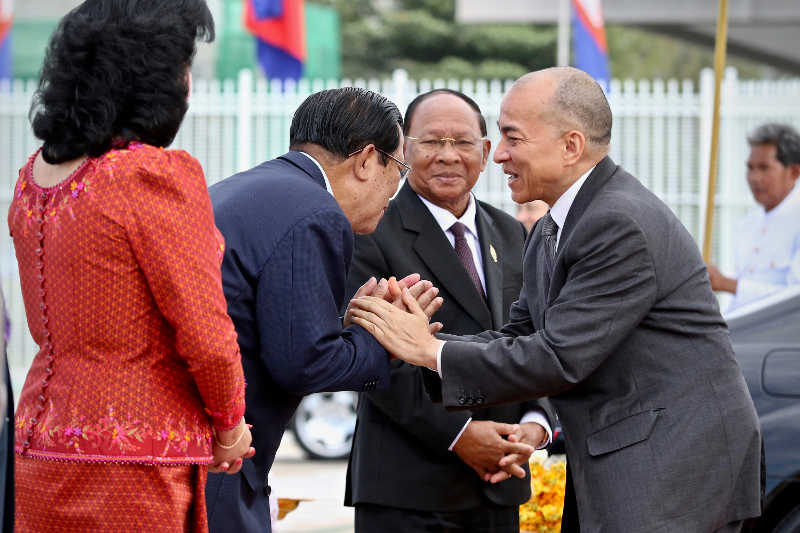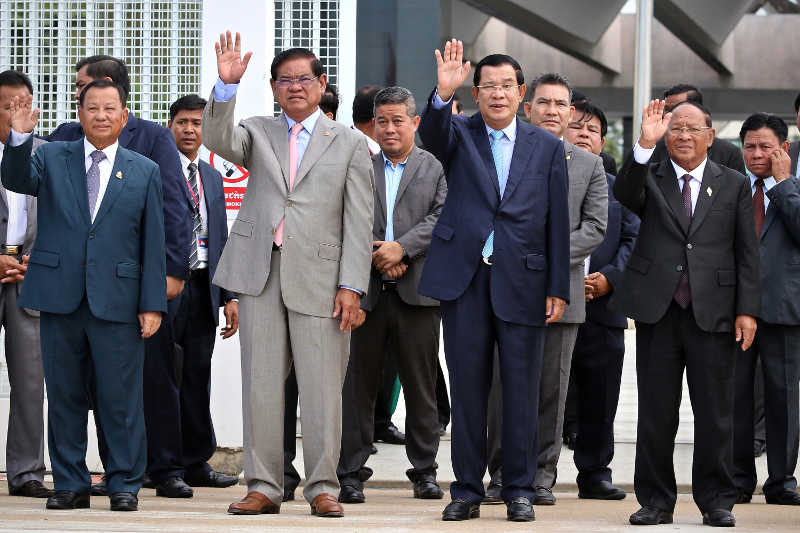King Norodom Sihamoni left the country on Sunday just as he was expected in the coming days to be called to sign a controversial set of changes to the Law on Political Parties that critics call unconstitutional.
His departure follows a formal petition delivered by the CNRP on Thursday asking the king to avoid endorsing the changes, which could hold the party liable for any endorsement of or affiliation with its former, exiled president Sam Rainsy.

And it repeats a similar trip he made to China in March amid an earlier set of amendments to the party law. At the time, he also claimed to be making a routine medical visit—which he has previously said he makes every six months—but apparently signed at least one other decree while abroad and met with Chinese leaders.
CPP officials on Sunday maintained that the king was not making a political statement by leaving.
“This is an annual visit that represents the historical friendship between the royal family and China built since the time of late King Father Norodom Sihanouk,” CPP spokesman Suos Yara wrote in a message on Sunday. “Nothing political.”
In a letter dated Saturday, the king said he was headed to China on Sunday for a “medical checkup.”
Prime Minister Hun Sen joined other senior CPP officials to see the king off at the airport on Sunday morning, with the prime minister wishing the king good health in three Facebook posts.
Neither the posts nor the letter were clear on when the king planned on returning, with past visits sometimes spanning two months.
The visit likely puts the proposed law, which is currently under review by the CPP-stacked Constitutional Council, in the hands of Senate President Say Chhum. As acting head of state, Mr. Chhum has authority only to sign the law and has no veto power.

The far-reaching legislative revisions bar political parties from consorting with anyone convicted of crimes or featuring them in party media in addition to adding new rules about party names and logos. Mr. Hun Sen made clear that the rules were targeted at his longtime nemesis Mr. Rainsy, who has lost legal challenges observers call politically motivated.
Rights groups and the CNRP say the changes would curtail a number of human rights and violate the Constitution, while the CPP says the revisions are necessary to keep criminals out of politics.
Political parties have begun preparing for the near-inevitable passage of the law, with the CNRP replacing signs of Mr. Rainsy and current President Kem Sokha with images of its rising sun logo.
The chairs of the party’s working group will meet on Tuesday to discuss the changes, according to CNRP Vice President Mu Sochua.
Acting Sam Rainsy Party President Teav Vannol continued to hold out hope that the king had “dropped a message” to Mr. Chhum advising him not to sign the amendments.
But his party was preparing for the worst with a meeting on Tuesday to discuss a new name, since its current one would be barred under the new rules.
Mr. Vannol suggested “Light of Democracy Party” for the group, which merged with Mr. Sokha’s Human Rights Party to form the CNRP in 2012 and exists to preserve opposition senator seats, but the party will also consider other names.
Funcinpec party spokesman Nhep Bunchin said his party had no choice but to remove Prince Norodom Ranariddh from party logos to comply with other provisions of the law barring individuals from party logos.
“You asked me, what is Funcinpec going to do? I have no idea,” he said. “It’s a legal procedure and we will respect the law.”
Mr. Bunchin criticized the CNRP for boycotting the vote on the law rather than slowing its passage through debate, and panned the opposition’s request for the king’s intervention as “useless.”
The king stepped into the political ring in a February letter calling for voters “not be concerned about oppression, threats or intimidation by anybody” in the run-up to the June 4 commune elections.
In March, he left the country for a medical checkup in China as legislators rushed through an earlier set of changes to the law that was eventually signed by Mr. Chhum.
His father, King Norodom Sihanouk, triggered a minor political crisis in 2004 when he declined to sign amendments to the Constitution that ended a nearly yearlong political deadlock between Funcinpec and the CPP by allowing a “package vote” for parliamentary and cabinet positions. Then, as now, civil society groups strenuously objected to the changes, which critics said cemented the power of Mr. Hun Sen and the CPP at the expense of democratic institutions.
Then-King Sihanouk left the vote to the “conscience” of then-Senate President Chea Sim, a factional rival of Mr. Hun Sen who was promptly escorted under heavy police surveillance to what CPP officials claimed was a medical checkup in Thailand. The law was ultimately signed by Nhek Bun Chhay, then a senior official in Funcinpec who has reappeared in headlines in recent weeks after he and several of his new political party’s supporters lost their government positions.
In 2005, Mr. Hun Sen threatened to dissolve the monarchy entirely after the retired King Sihanouk said his son would be abroad for a vote on a controversial border treaty with Vietnam.
King Sihamoni’s latest trip is little more than a “gentle gesture” in a system that gives the monarchy only symbolic weight, said Markus Karbaum, a German political scientist with a focus on Cambodia.
The king’s actual role demanded that he promote national unity through “political-cultural folklore,” Mr. Karbaum wrote in an email.
“There is a mutual dependency—the king provides the framework for political legitimation while the government ensures the monarchy and the privileges of the royal family,” he said. “Hence, there is only very limited space to express a notion of disagreement.”



